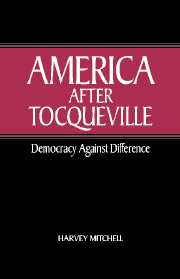Book contents
- Frontmatter
- Contents
- References to Tocqueville's Democracy in America
- Preface
- I PATHS TO DEMOCRACY IN AMERICA
- 1 Introduction: Thinking about American Democracy
- 2 Democracy's Experiment: From Inequality to Equality
- 3 Achieving a Democratic Civil Society
- II BEGINNINGS AND DEMOCRACY
- III AMERICAN DEMOCRACY ON TRIAL
- 10 Conclusion
- Works Cited
- Index
2 - Democracy's Experiment: From Inequality to Equality
Published online by Cambridge University Press: 10 August 2009
- Frontmatter
- Contents
- References to Tocqueville's Democracy in America
- Preface
- I PATHS TO DEMOCRACY IN AMERICA
- 1 Introduction: Thinking about American Democracy
- 2 Democracy's Experiment: From Inequality to Equality
- 3 Achieving a Democratic Civil Society
- II BEGINNINGS AND DEMOCRACY
- III AMERICAN DEMOCRACY ON TRIAL
- 10 Conclusion
- Works Cited
- Index
Summary
The disputes over race and color in the United States were not absent from the debates over the provisions of the U.S. Constitution. However, the question of what structures of government would best express the goals of the American Republic, particularly the fears expressed over the unmediated force of the popular will, was their major focus. This aversion to full popular sovereignty cannot be fully understood without a clearer idea of why, even as many participants in the debate rejected the aristocratic ethos, and questioned the notion that the British Parliament faithfully and legally represented all British subjects, they worked to consolidate a bourgeois concept of personal worth, and forcefully used it as an argument to keep alive social distinctions and political inequality. It was within that concept that Anglo-Americans sought to locate non-whites, but the place they chose for them was not an unambiguous one, if only because bourgeois liberalism could not satisfactorily reconcile its confidence that rational thought was, in theory at least, vouchsafed to all, with their earliest doubts that all human beings were capable of it, even whites. The result was to present future generations of Americans with a chronically uncertain notion of where they were all supposed to fit — at the center, or on the edge, of equality, somewhere in between, or more disputably, as it were, nowhere.
- Type
- Chapter
- Information
- America after TocquevilleDemocracy against Difference, pp. 23 - 48Publisher: Cambridge University PressPrint publication year: 2002



